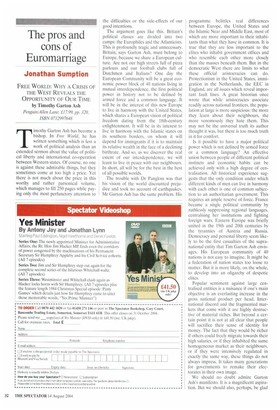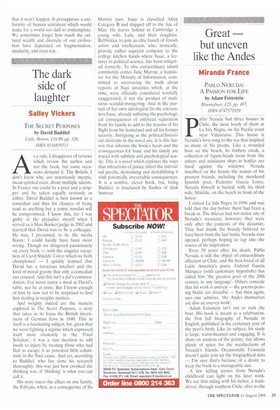The pros and cons of Euromarriage
Jonathan Sumption
FREE WORLD: WHY A CRISIS OF THE WEST REVEALS THE OPPORTUNITY OF OUR TIME by Timothy Garton Ash
Penguin/Allen Lane, £17.99, pp. 320, ISBN 0712997648
Timothy Garton Ash has become a bishop. In Free World, he has written something which is less a work of political analysis than an extended sermon about the value of political liberty and international co-operation between Western states. Of course, no one is against these admirable things, but they sometimes come at too high a price. Yet there is not much about the price in this worthy and rather parsonical volume, which manages to fill 250 pages while paying only the most perfunctory attention to
the difficulties or the side-effects of our good intentions.
The argument goes like this. Britain's political classes are divided into two camps: the Europhiles and the Atlanticists. This is profoundly tragic and unnecessary. Britain, says Garton Ash, must belong to Europe, because we share a European culture. Are not our high streets full of pizza parlours and our football clubs full of Dutchmen and Italians? One day the European Community will be a great economic power block of 40 nations living in mutual interdependence, the first political power in history not to be defined by armed force and a common language. It will be in the interest of this new Europe to live in harmony with the United States, which shares a European vision of political freedom dating from the 18th-century enlightenment. It will be in its interest to live in harmony with the Islamic states on its southern borders, on whom it will depend for immigrants if it is to maintain its relative wealth in the face of a declining birthrate. And so, as we discover the real extent of our interdependence, we will learn to live in peace with our neighbours. In short, all will be for the best in the best of all possible worlds.
The trouble with Dr Pangloss was that his vision of the world discounted prejudice and took no account of earthquakes. Mr Garton Ash has the same problem. His
programme belittles real differences between Europe, the United States and the Islamic Near and Middle East, most of which are more important to their inhabitants than what they have in common. It is true that they are less important to the elites who inhabit government offices and who resemble each other more closely than the masses beneath them. But in the democratic West there are limits to what these official aristocracies can do. Protectionism in the United States, immigration in the Netherlands, the EEC in England, are all issues which reveal important fault lines. A great historian once wrote that while aristocracies associate readily across national frontiers, the population at large is more suspicious: the more they learn about their neighbours, the more venomously they hate them. This may not be the universal truth its author thought it was, but there is too much truth in it for comfort.
Is it possible to have a major political power which is not defined by armed force or a common language? An effective union between people of different political instincts and economic habits can be achieved only with a high degree of centralisation. All historical experience suggests that the only condition under which different kinds of men can live in harmony with each other is one of common subjection to an authoritarian government. This requires an ample reserve of force. France became a single political community by ruthlessly suppressing regional languages, centralising her institutions and fighting foreign wars. Eastern Europe was briefly united in the 19th and 20th centuries by the tyrannies of Austria and Russia. Democracy and personal liberty seem likely to be the first casualties of the supranational entity that Tim Garton Ash envisages. His European community of 40 nations is not easy to imagine. It might be a federation of nation states too loose to matter. But it is more likely, on the whole, to develop into an oligarchy of despotic elites.
Popular sentiment against large centralised entities is a nuisance if one's main objective is an everlasting increase in the gross national product per head. International discord and the fragmented markets that come with it are highly destructive of material riches. But beyond a certain point it is not at all clear that people will sacrifice their sense of identity for money. The fact that they would be richer if others could freely migrate towards their high salaries, or if they inhabited the same homogeneous market as their neighbours, or if they were intensively regulated in exactly the same way, these things do not always impress. It takes many generations for governments to remake their electorates in their own image.
We should no doubt admire Garton Ash's manifesto. It is a magnificent aspiration. But we should also, perhaps, be glad that it won't happen. It presupposes a uniformity of human sentiment which would make for a world too dull to contemplate. We sometimes forget how much the cultural wealth and diversity of our civilisation have depended on fragmentation, insularity, and even war.



























































 Previous page
Previous page